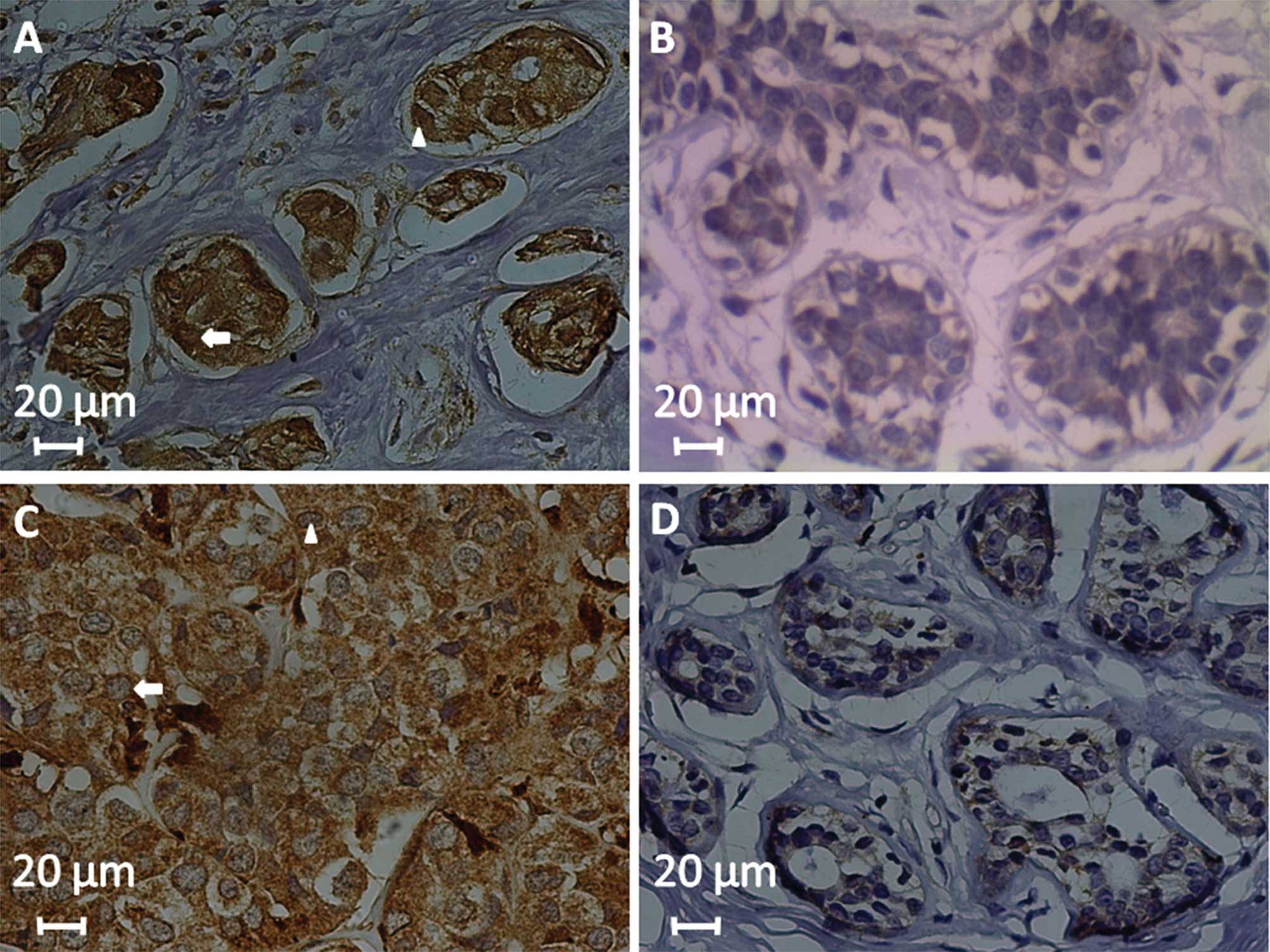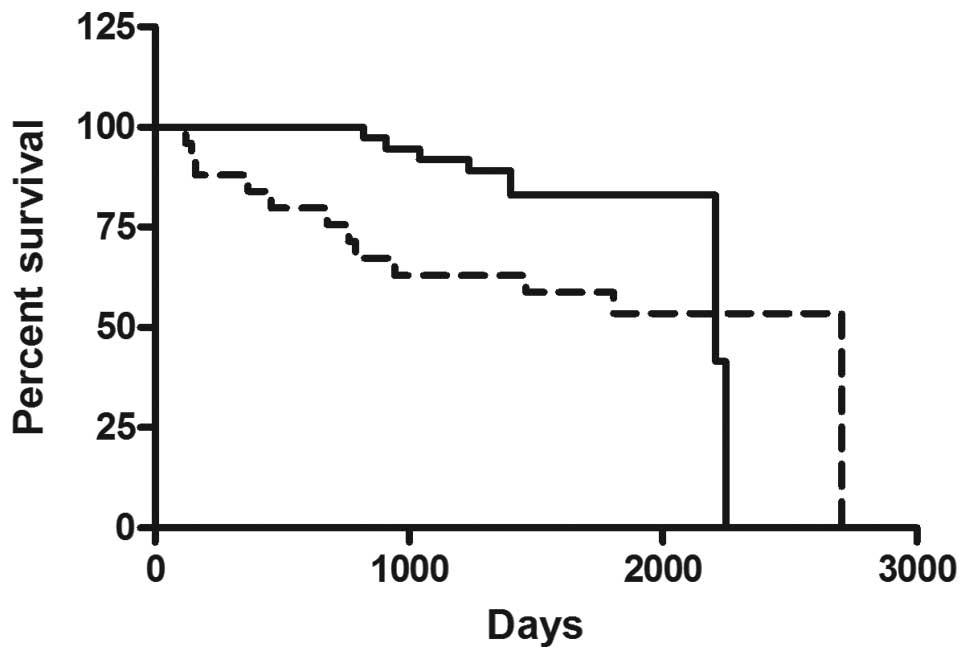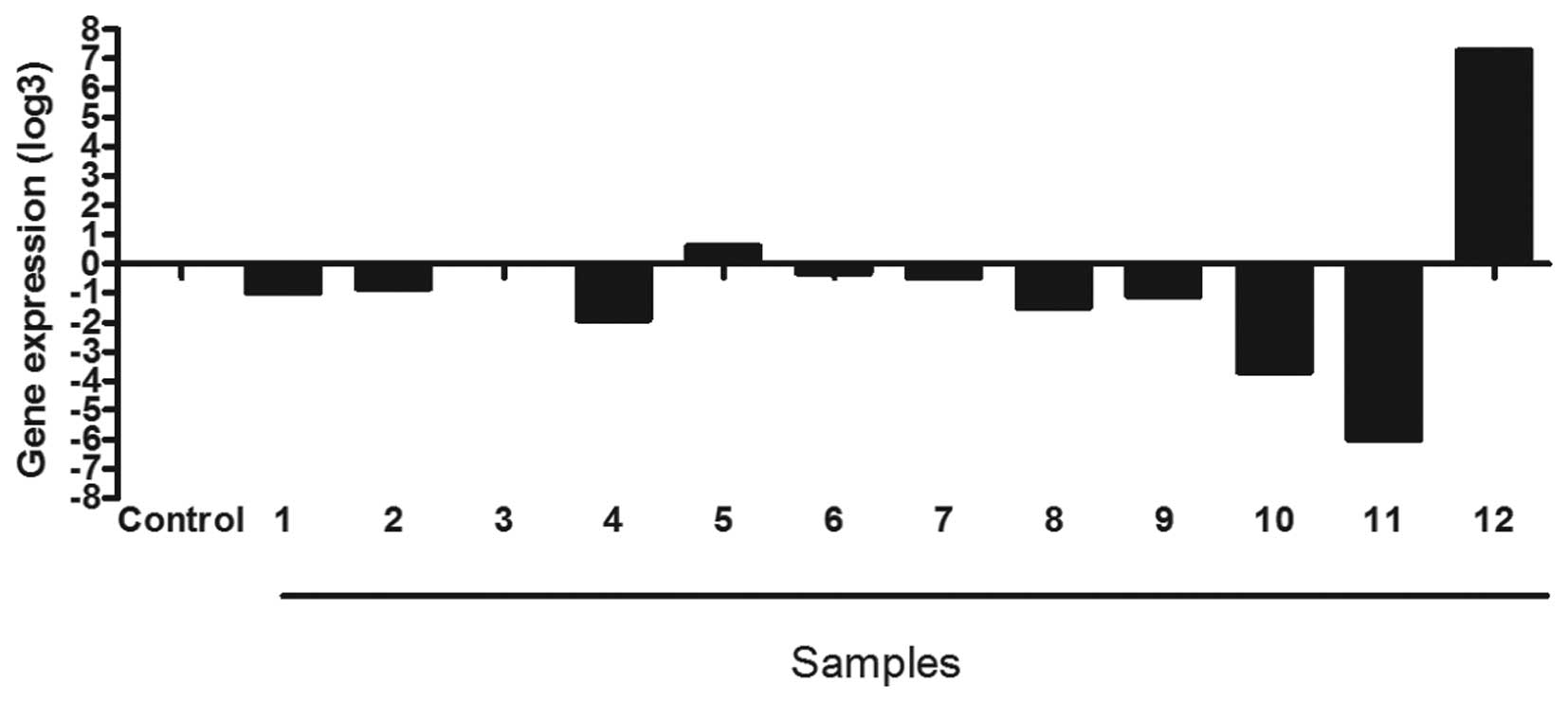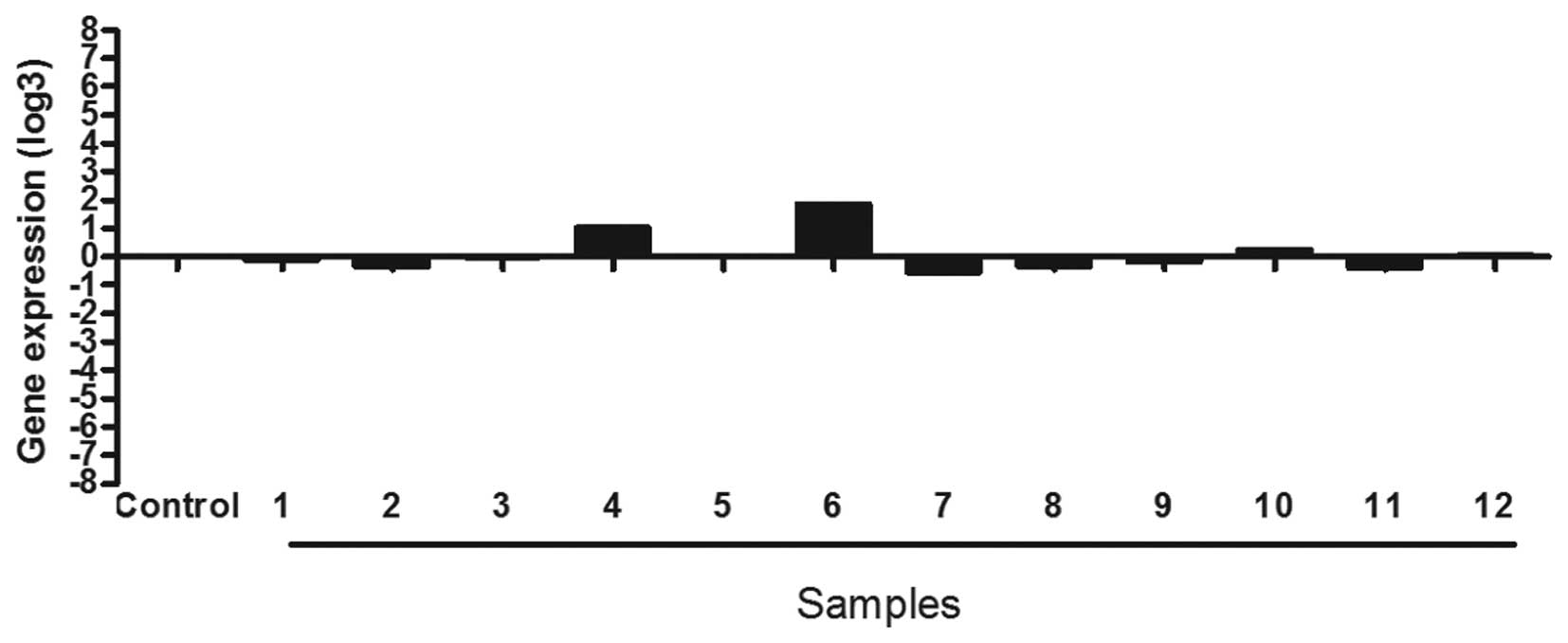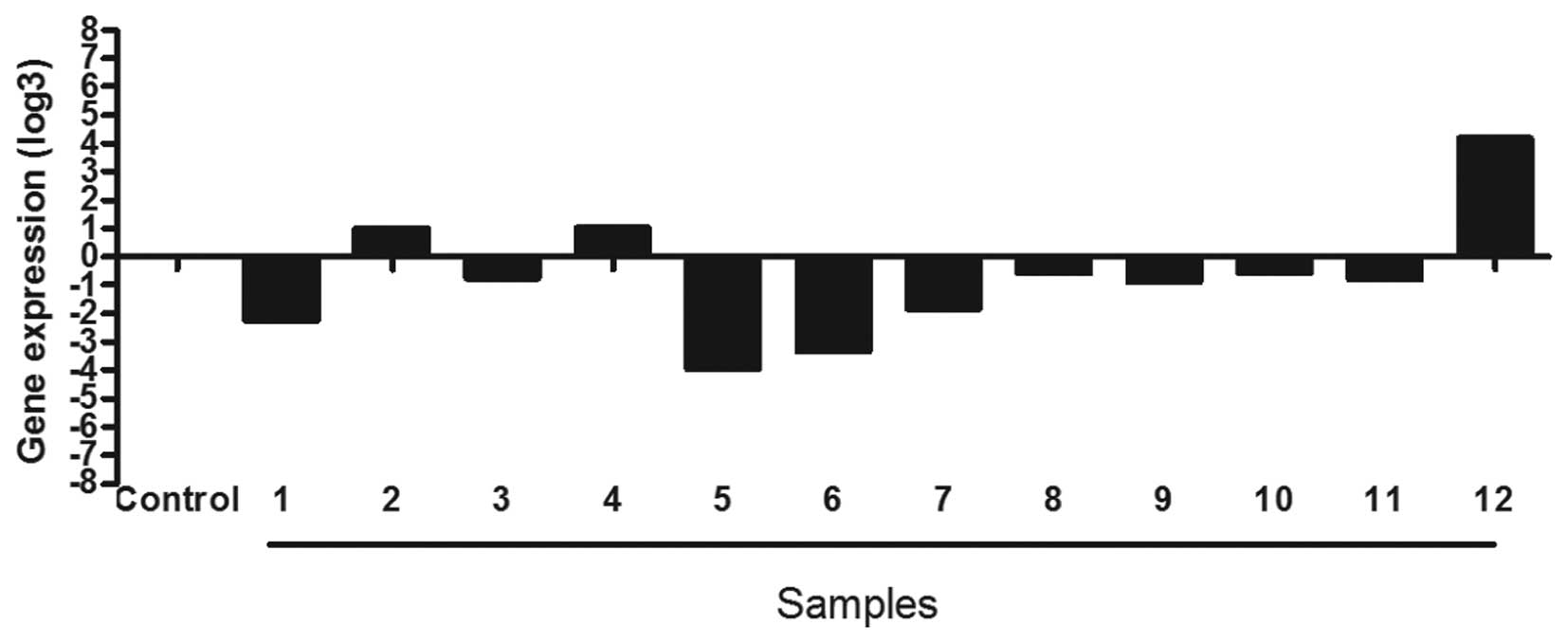|
1
|
Gonzalez-Angulo AM, Moraes-Vasquez F and
Hortobagyl GN: Overview of resistance to systemic therapy in
patients with breast cancer. Adv Exp Med Biol. 608:1–22. 2007.
View Article : Google Scholar : PubMed/NCBI
|
|
2
|
Instituto Nacional do Câncer (INCA).
Estimativas da incidência e mortalidade por câncer no Brasil.
Ministério da Saúde Rio de Janeiro. http://www.inca.gov.br/estimativa/2010/index.asp?link=conteudo_view.asp&ID=5.
Accessed Nov. 20, 2011
|
|
3
|
Gralow J, Ozols RF, Bajorin DF, et al:
Clinical cancer advances 2007: major research advances in cancer
treatment, prevention, and screening - a report from the American
Society of Clinical Oncology. J Clin Oncol. 26:313–325. 2008.
View Article : Google Scholar : PubMed/NCBI
|
|
4
|
Hicks DG and Kulkarni S: Trastuzumab as
adjuvant therapy for early breast cancer. Arch Pathol Lab Med.
132:1008–1015. 2008.PubMed/NCBI
|
|
5
|
vant’t Veer LJ, Paik S and Hayes DF: Gene
expression profiling of breast cancer: a new tumor marker. J Clin
Oncol. 23:1631–1635. 2005.PubMed/NCBI
|
|
6
|
Pedersen L, Gunnarsdottir KA, Rasmussen
BB, et al: The prognostic influence of multifocality in breast
cancer patients. Breast. 13:188–193. 2004. View Article : Google Scholar : PubMed/NCBI
|
|
7
|
Duffy MJ and Crown J: A personalized
approach to cancer treatment: how biomarkers can help. Clin Chem.
54:1770–1779. 2008. View Article : Google Scholar : PubMed/NCBI
|
|
8
|
Thomas E and Berner G: Prognostic and
predictive implications of HER2 status for breast cancer patients.
Eur J Oncol Nurs. 4:10–17. 2000. View Article : Google Scholar : PubMed/NCBI
|
|
9
|
Duffy MJ, O’Donovan N and Crown J: Use of
molecular markers for predicting therapy response in cancer
patients. Cancer Treat Rev. 37:151–159. 2011. View Article : Google Scholar : PubMed/NCBI
|
|
10
|
Pastore A, Federici G, Bertini E and
Piemonte F: Analysis of glutathione: implication in redox and
detoxification. Clin Chem Acta. 333:19–39. 2003. View Article : Google Scholar : PubMed/NCBI
|
|
11
|
Townsend DM and Tew KD: The role of
glutathione-S-transferase in anti-cancer drug resistance. Oncogene.
22:7369–7375. 2003. View Article : Google Scholar : PubMed/NCBI
|
|
12
|
Jardim BV, Moschetta MG, Gelaleti GB, et
al: Glutathione transferase pi (GSTpi) expression in breast cancer:
An immunohistochemical and molecular study. Acta Histochem.
114:510–517. 2012. View Article : Google Scholar : PubMed/NCBI
|
|
13
|
Huber PC, Almeida WP and Fatima A:
Glutationa e enzimas relacionadas: papel biológico e importância em
processos patológicos. Quím Nova. 31:1170–1179. 2008.
|
|
14
|
Carnicer MJ, Bernardini S, Bellincampi L,
et al: Role of γ-glutamyl cysteine synthetase (γ-GCS) gene
expression as marker of drug sensitivity in acute myeloid
leukemias. Clin Chem Acta. 365:342–345. 2006.
|
|
15
|
Uchida M, Sugaya M, Kanamaru T and
Hisatomi H: Alternative RNA splicing in expression of the
glutathione synthetase gene in human cells. Mol Biol Rep.
37:2105–2109. 2010. View Article : Google Scholar : PubMed/NCBI
|
|
16
|
Valko M, Leibfritz D, Moncol J, et al:
Free radicals and antioxidants in normal physiological functions
and human disease. Int J Biochem Cell Biol. 39:44–84. 2007.
View Article : Google Scholar : PubMed/NCBI
|
|
17
|
Ballatori N, Krance SM, Notenboom S, et
al: Glutathione dysregulation and the etiology and progression of
human diseases. Biol Chem. 390:191–214. 2009. View Article : Google Scholar : PubMed/NCBI
|
|
18
|
Kumaraguruparan R, Balachandran C, Manohar
BM and Nagini S: Altered oxidant-antioxidant profile in canine
mammary tumours. Vet Res Commun. 29:287–296. 2005. View Article : Google Scholar : PubMed/NCBI
|
|
19
|
Rajneesh CP, Manimaran A, Sasikala KR and
Adaikappan P: Lipid peroxidation and antioxidant status in patients
with breast cancer. Singapore Med J. 49:640–643. 2008.PubMed/NCBI
|
|
20
|
Kasapović J, Pejić S, Stojiljković V, et
al: Antioxidant status and lipid peroxidation in the blood of
breast cancer patients of different ages after chemotherapy with
5-fluorouracil, doxorubicin and cyclophosphamide. Clin Biochem.
43:1287–1293. 2010.PubMed/NCBI
|
|
21
|
Hammond ME, Hayes DF, Dowsett M, et al:
American Society of Clinical Oncology/College of American
Pathologists guideline recommendations for immunohistochemical
testing of estrogen and progesterone receptors in breast cancer. J
Clin Oncol. 28:2784–2795. 2010. View Article : Google Scholar
|
|
22
|
Livak KJ and Schmittgen TD: Analysis of
relative gene expression data using real-time quantitative PCR and
the 2(−ΔΔCT) method. Methods. 25:402–408. 2001.
|
|
23
|
Yeh CC, Hou MF, Wu SH, et al: A study of
glutathione status in the blood and tissues of patients with breast
cancer. Cell Biochem Funct. 24:555–559. 2006. View Article : Google Scholar : PubMed/NCBI
|
|
24
|
Kasapović J, Pejić S, Todorović A, et al:
Antioxidant status and lipid peroxidation in the blood of breast
cancer patients of different ages. Cell Biochem Funct. 26:723–730.
2008.
|
|
25
|
Fernandes RC, Bevilacqua JL, Soares IC, et
al: Coordinated expression of ER, PR and HER2 define different
prognostic subtypes among poorly differentiated breast carcinomas.
Histopathology. 55:346–352. 2009. View Article : Google Scholar
|
|
26
|
Basu S, Chen W, Tchou J, et al: Comparison
of triple-negative and estrogen receptor-positive/progesterone
receptor-positive/HER2-negative breast carcinoma using quantitative
fluorine-18 fluorodeoxyglucose/positron emission tomography imaging
parameters: a potentially useful method for disease
characterization. Cancer. 112:995–1000. 2008.
|
|
27
|
Murawaki Y, Tsuchiya H, Kanbe T, et al:
Aberrant expression of selenoproteins in the progression of
colorectal cancer. Cancer Lett. 259:218–230. 2008. View Article : Google Scholar : PubMed/NCBI
|
|
28
|
Li S, Yan T, Yang JQ, et al: The role of
cellular glutathione peroxidase redox regulation in the suppression
of tumor cell growth by manganese superoxide dismutase. Cancer Res.
60:3927–3939. 2000.PubMed/NCBI
|
|
29
|
Estrela JM, Ortega A and Obrador E:
Glutathione in cancer biology and therapy. Crit Rev Clin Lab Sci.
43:143–181. 2006. View Article : Google Scholar
|
|
30
|
Gaudiano G, Koch TH, LoBello M, et al:
Lack of glutathione conjugation to adriamycin in human breast
cancer MCF-7/DOX cells. Inhibition of glutathione S-transferase
p1-1 by glutathione conjugates from anthracyclines. Biochem
Pharmacol. 60:1915–1923. 2000. View Article : Google Scholar : PubMed/NCBI
|
|
31
|
Ozkan A and Fiskin K: Protective effect of
antioxidant enzymes against drug cytotoxicity in MCF-7 cells. Exp
Oncol. 28:86–88. 2006.PubMed/NCBI
|
|
32
|
Ilvasova D, Mixon G, Wang F, et al:
Markers of oxidative status in a clinical model of oxidative
assault: a pilot study in human blood following doxorubicin
administration. Biomarkers. 14:321–325. 2009. View Article : Google Scholar : PubMed/NCBI
|
|
33
|
Han XQ, Li ZH, Zhang JG, et al: Effect of
decreased GSH on sensitivity of breast cancer cells to ADM. Sichuan
Da Xue Xue Bao Yi Xue Ban. 36:770–774. 2007.(In Chinese).
|
|
34
|
Vibet S, Goupille C, Bougnoux P, et al:
Sensitization by docosahexaenoic acid (DHA) of breast cancer cells
to anthracyclines through loss of glutathione peroxidase (GPx1)
response. Free Radic Biol Med. 44:1483–1491. 2008. View Article : Google Scholar : PubMed/NCBI
|
|
35
|
Sun W, Kalen AL, Smith BJ, et al:
Enhancing the antitumor activity of adriamycin and ionizing
radiation. Cancer Res. 69:4294–4300. 2009. View Article : Google Scholar : PubMed/NCBI
|
|
36
|
Di X, Shiu RP, Newsham IF and Gewirtz DA:
Apoptosis, autophagy, accelerated senescence and reactive oxygen in
the response of human breast tumor cells to adriamycin. Biochem
Pharmacol. 77:1139–1150. 2009. View Article : Google Scholar : PubMed/NCBI
|















